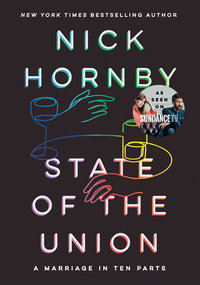 State of the Union: A Marriage in Ten Parts
State of the Union: A Marriage in Ten Parts
by Nick Hornby
Paperback, 132 pg.
Riverhead Books, 2019
Read: June 4, 2019

| [Louise says,] “Underneath it all, I love you.”
“Underneath it all.” “Yes.” “Great.” “To be honest, I think you should be happy with that. You’re lucky there’s anything still there.” |
Tom and Louise are in trouble — they’ve been married for years, have kids, and on the outside seem to be doing fine. But the marriage is in trouble — and it has been for awhile. Recent events have demonstrated just how bad the situation is, and Louise has talked Tom into counseling. Each week before their session, they meet in the pub across the street for a quick drink and to talk about what they’ll discuss in the upcoming session — also reacting to the previous session, what’s gone on in the week since, and discuss their future — if such exists.
Ten sessions. Ten very short chapters. More than 10 pints and glasses of white wine. 10 fantastic, intriguing, character revealing, entertaining conversations.
I guess I tipped my hand a bit there, didn’t I? It’s not much of a surprise that I loved this book because it’s written by Nick Hornby. And even when I’m not crazy about the novel in the end, there are few writers out there I enjoy reading as much as Hornby (alas, most of his novels predate this here blog, so you’ll have to take my word for it).
But it’s Hornby that takes what could be a maudlin exercise, a too-jokey experience, or an all-around failure and turns it into an experiment that’s successful, entertaining, and emotionally rich. I see Tom’s point of view, understand his pain and get his reluctance to do the work he needs to. I also understand Louise’s take, I get (don’t approve of, but get) her reaction to Tom, and appreciate her willingness to do the work (while seeing her own weaknesses — at least some of them). A lot of times in this kind of scenario, the reader will end up “taking the side” of one of the characters (frequently the one sharing their gender). But very quickly I noticed that I wasn’t rooting for Tom or Louise here, I was rooting for Tom and Louise.
But best of all? I loved reading their conversations — open, honest (an honesty borne from realizing they’ve got no choice at this point, what could would anything else do?) full of that love that’s “underneath it all” for both. And somehow, still entertaining for the reader.
I typically limit myself to one quotation from a book, but I there’s another I want to share to give a flavor for the way the book works on the mechanical level.
| “How are new starts possible?” Louise says. “When you’ve been together for a long time, and you have kids, and you’ve spent years and years being irritated by the other person? But if they stop being irritating, they’re not them anymore.”
“My text was me not being me.” “Exactly.” They walk to the door. “So I’ve got to stay as me.” “Yes.” “While at the same time being different, somehow.” “It’s a conundrum.” |
One, count ’em, one dialogue tag. Five words of description. Which is pretty typical of the book (maybe a little heavy on the description). That’s practically nothing — and dialogue tags pretty much only show up after description so you know who’s starting the back and forth — it could easily be a page or more before the next one. It’s like Hornby’s version of an acoustic recording — a story stripped down to its essence. Maybe that’s not the best metaphor — it’s the literary equivalent of espresso, the bare minimum, concentrated. Ian Shane called it “a literary play.” I like that, too.
The minimalism makes this a deceptively quick and easy read — you start flying through the text, caught up in the conversation and then realize just what it was they’re being breezy about, just in time for a line that emphasizes just what’s at stake.
This was also a show on Showtime recently — ten 10-minute episodes, as I understand. I don’t know which came first — the show or the book. If it was the book, I don’t know that a script would really be necessary — just hand them this book and say “go.” And if it was the other way around, it’d be about the easiest adaptation from a script ever.
At the end of the day, this is exactly what you want from a Nick Hornby book (except the length — I wanted more, always): funny, heartfelt, charming, (seemingly) effortless, and makes you feel a wide range of emotions without feeling manipulated. I loved it, I think you will, too.
Note: I won a copy of this from Riverhead Books via Goodreads — and I thank them both for that. But my library got me a copy first, so I haven’t read it yet. But it will be the copy I re-read (and I think I’ll be doing that a lot).
—–




Read Irresponsibly, but please Comment Responsibly